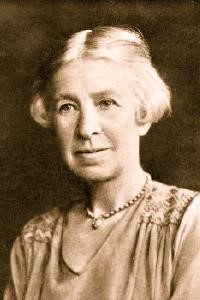Evelyn Underhill, Mystic and Writer

Dates: 1875-1941
Locations: London, England
Feast Day: June 15
Context: Evelyn Underhill was an English Anglican mystic who is one of the most influential spiritual writers of the twentieth century. Underhill was born in Wolverhampton, England. In her early life she reported experiencing a series of mystical visions, which spurred her conversion to Christ. She married a barrister, and studied history and botany at King’s College, London. She published several books on Christian spirituality and theology, as well as three novels. Underhill felt a lifelong attraction to Catholicism, but the objections of her Protestant husband and some doubts of her own meant that she remained a lifelong member of the Church of England. An ardent promoter of medieval mystics, she was one of the Church of England’s most prominent Anglo-Catholic voices. Although she herself was opposed to the ordination of women, Underhill was the first woman to give lectures for clergy in the Church of England, the first woman to officially conduct spiritual retreats for the Church, and one of the first women theologians to lecture on theology at English universities. She was a spiritual director and retreat leader for countless individuals. Correspondence between Underhill and her own spiritual director shows that Underhill’s spiritual life was often a struggle. She longed to know and love God as much as she could, but she was acutely aware of her own shortcomings. She admits that she never received a sense of assurance from God about the validity of her mystical experiences. One of the main emphases of Underhill’s thought is that a lack of consolation from God, or not feeling God’s presence, can be one of the most fruitful stages of the spiritual life, leading to stronger and purer faith.
Excerpt from Mysticism (1911):
“..Thou hast taken from me all that I had of Thee, yet of Thy grace leave me the gift which every dog has by nature: that of being true to Thee in my distress, when I am deprived of all consolation.”
Excerpt from Practical Mysticism (1915):
“Eternity is with us, inviting our contemplation perpetually, but we are too frightened, lazy, and suspicious to respond; too arrogant to still our thought, and let divine sensation have its way. It needs industry and goodwill if we would make that transition; for the process involves a veritable spring-cleaning of the soul, a turning-out and rearrangement of our mental furniture, a wide opening of closed windows, that the notes of the wild birds beyond our garden may come to us fully charged with wonder and freshness, and drown with their music the noise of the gramophone within. Those who do this, discover that they have lived in a stuffy world, whilst their inheritance was a world of morning-glory: where every mouse is a celestial messenger, and every thrusting bud is charged with the full significance of life.
…Do not suppose from this that your new career [as a contemplative Christian] is to be perpetually supported by agreeable spiritual contacts, or occupy itself in the mild contemplation of the great world through which you move. True, it is said of the Shepherd that he carries the lambs in his bosom: but the sheep are expected to walk, and put up with the inequalities of the road, the bunts and blunders of the flock.”
Discussion Questions:
- How can being deprived of consolation (the “dark night of the soul”) lead to a better relationship with God?
- Why do you think we sometimes find it difficult to quiet our internal noise and focus on God?
- What are some ways we can be more open to what God is saying to us and doing within us on a moment-by-moment basis?
- What role does adversity play in the contemplative life? In other words, how does going through difficult situations make us more receptive to God?
- What role does the local Christian community play in our own spiritual growth?


Comments are closed.